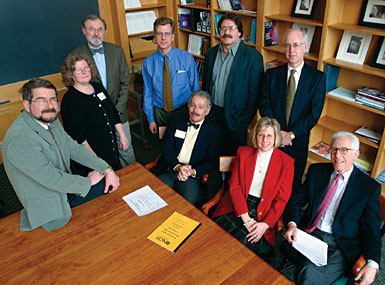In looking at the brain, many heads are better than one
Neuroscientists worldwide are exploring the brain: how it processes information, how the nervous system recovers from injury, how chemical signals ignite different neural responses. Dartmouth neuroscientists have long been tackling such heady topics, too. Now, the newly established Neuroscience Center at Dartmouth (NCD) links all neuroscience experts on campus under one umbrella, blending clinical neurology and neurosurgery with basic and cognitive research in the neurosciences.
"Neuroscience interests at Dartmouth have long been outstanding in many areas, but spread across many departments and sometimes fragmented," says NCD advisory board member David Roberts, M.D., a professor of neurosurgery. "Increased collaboration with our colleagues in other disciplines enhances all of our efforts to advance our understanding of the neurosciences."

|
|
Joyce DeLeo (in red) is the interim director of the new Neuroscience Center at Dartmouth
and one of many heads taking a collaborative approach to looking at the brain. |
Dartmouth is the last of the Ivy League schools to establish a neuroscience program. "So many of us have wanted this," says the NCD's interim director, Joyce DeLeo, Ph.D., an associate professor of anesthesiology and of pharmacology.
Shape: But although a latecomer to having an official program, Dartmouth is blazing ground in the way its program is shaped. Most of the 250 U.S. schools with neuroscience programs focus on basic research, says DeLeo. But the NCD also encompasses cognitive research and clinical issues.
Neuroscientists at Dartmouth are spread throughout 16 departments and work in the molecular, cellular, systems, behavioral, cognitive, and clinical arenas. There are over 150 active grants in the neurosciences, totaling about $19 million. Dartmouth is particularly strong in multiple sclerosis, epilepsy, chronic pain, neuro-oncology, and schizophrenia, says DeLeo. There is also work ongoing on prion diseases; biological clocks; sleep deprivation; traumatic brain injury; memory; neurodegenerative diseases; and neural imaging.
Collegial: "The NCD is a neuroscience center without walls, pulling together investigators throughout the Medical School, College, and Medical Center to work in a collaborative, supportive environment," says Gregory Holmes, M.D., chief of neurology and another of the NCD's nine advisory board members.
That collegial environment is what distinguishes Dartmouth and the NCD, says DeLeo, who has worked at other research institutions. "Dartmouth is not a transient place, so you build relationships," which are a key to effective collaboration.
"The center has already been instrumental in increasing awareness among the investigators of opportunities to collaborate . . . through dialogue and conferences," adds Holmes.
In addition to hosting seminars and conferences, the NCD will facilitate communication among neuroscientists via print and the Web and encourage collaborative grant submissions. It's also establishing a neuroscience training program; developing new courses for undergraduates, graduate students, and medical students; creating an undergraduate neuroscience major; and aiming to recruit more neuroscientists in the next few years.
"With better integration and coordination," Roberts says, "Dartmouth can take its rightful place among institutional leaders in the field."
Laura Stephenson Carter
If you would like to offer any feedback about this article, we would welcome getting your comments at DartMed@Dartmouth.edu.
